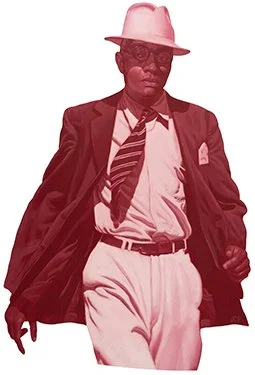B.C. Franklin by Joel Daniel Phillips. Oil on Panel.
Buck Colbert (B.C.) Franklin (1879-1960) was a prominent Black attorney, civil rights advocate, and community leader best known for his role in the aftermath of the 1921 Tulsa Race Massacre. Born to formerly enslaved parents in what is now western Oklahoma, Franklin was an influential figure in the early 20th century legal and civil rights circles.
After earning his law degree and practicing in various parts of Oklahoma, Franklin settled in Tulsa’s Greenwood District, a prosperous Black community. Franklin witnessed the destruction of Greenwood during the 1921 Tulsa Race Massacre, including the burning of homes, businesses, and churches by White mobs. In the massacre’s aftermath, Franklin played a pivotal role in fighting for the rights of the Black residents whose properties were destroyed. He set up a law office in a Red Cross tent and filed numerous lawsuits on behalf of those who lost everything.
One of Franklin’s most notable legal achievements was his successful challenge to the city’s attempt to prevent Black residents from rebuilding Greenwood. The city had passed new zoning ordinances designed to black reconstruction, but Franklin argued against these ordinances in court and won, enabling the rebuilding of the district.
In addition to his legal work, Franklin documented his experiences in a manuscript that was posthumously published as My Life and and Era: The Autobiography of Buck Colbert Franklin, offering a personal perspective on the massacre and its aftermath. His son, John Hope Franklin, would go on to become a renowned historian and civil rights leader, continuing his legacy of advocacy and scholarship.
B.C. Franklin’s legacy is that of a courageous and dedicated attorney who fought tirelessly for justice and the restoration of his community, leaving an indelible mark on American legal history and civil rights.
